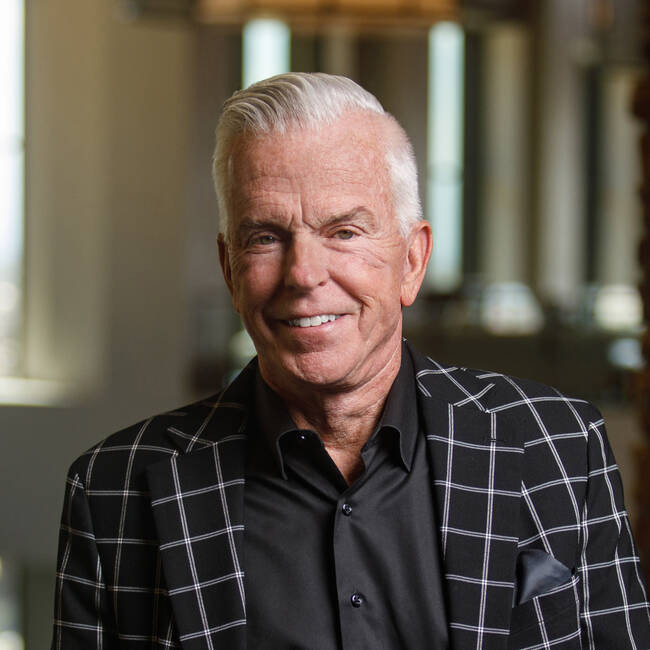Lisa has the winning combination you look for in a keynote speaker. She is insightful, engaging and energetic. She was the top rated speaker at two Google events and inspired our audience to start an innovation revolution.

Lisa Bodell
CEO, FutureThink; Bestselling Author, Why Simple Wins
Profile Links
Fee Range
Please contact us for pricingTravels From
New York, NY, US
Lisa Bodell
Biography
When the most important work isn’t getting done, it’s not the people that need to be fixed – it’s the work. Lisa Bodell, a global leader on simplification, collaboration, and innovation, helps organizations transform performance by reimagining the work. By trading complexity for simplicity, organizations find new ways to unleash creativity and spark the energy so essential to innovate and compete. It also lifts morale, increases engagement, and improves employee well-being and retention. Lisa is the author of two groundbreaking books, Why Simple Wins and Kill the Company. She ranks on the “Top 50 Speakers Worldwide” list and captivates audiences with her insights, energy, and humor. Lisa inspires them to question the status quo and make small changes that have profound impact – giving them time and energy to focus on the work that matters most.
After earning her business degree from University of Michigan, Lisa launched her career at Leo Burnett in Chicago, where she discovered a gift for uniting strategically-driven ideas with forward-thinking themes. She went on to build two successful businesses before moving to New York and focusing on the simplification and innovation space with FutureThink. Founded in 2003, FutureThink works with leading brands worldwide and has become one of the largest sources for simplification and innovation research, tools, and training in the world.
Lisa brings a compelling perspective to the sought-after topics of simplification and innovation to thousands of people each year. A thought leader and serial entrepreneur, her transformational message has inspired executives at top-ranked organizations such as Google, SAP, Citigroup, and the Department of National Intelligence to lead change in their organizations.
Lisa has contributed her expertise to a wide variety of media. She is a monthly contributor to Forbes and has frequently appeared in other media including: Fast Company, WIRED, The New York Times, Harvard Business Review, and CNN. She has also been featured in many major books such as Warren Berger’s A More Beautiful Question, Adam Grant’s Originals, and AfterShock, the 50-year celebration based on futurist Alvin Toffler’s Future Shock.
Lisa has taught innovation at both American University and Fordham University and has a TED popular talk on the topic. She serves on the board of advisors of several organizations, including the Global Agenda Council for the World Economic Forum, the United States National Security Agency, the Association of Professional Futurists, and Novartis.
Lisa Bodell
Featured Videos
Current: Speaker Reel
More Videos From Lisa Bodell
Lisa Bodell
Featured Keynote Programs
The Simplicity Solution
Reclaim Control and Thrive in Times of Upheaval
We’re no longer managing change at work – we’re coping with chaos. There’s too much – of everything. With people overwhelmed by complexity and the path forward anything but clear, the answer is to not try and control chaos, the solution is to embrace simple. In this presentation, Lisa Bodell shows organizations why simplicity is no longer a “nice to have” – it’s the strategy to eliminate noise, regain focus, and unleash the capacity to create the future.
Lisa’s passion for simplicity is personal. Raised in a home filled with instability and unpredictability, she learned early how to survive chaos. That skill propelled her corporate success – but it also led to burnout. It wasn’t until she realized she didn’t need to manage chaos – she needed to eliminate it – that everything changed.
Backed by more than 25 years of global experience and compelling case studies from organizations like Netflix, AT&T, and Pfizer, Lisa shares the practical tools and mindset shifts that help organizations simplify how work gets done – without sacrificing results. Through humor, interactive polling technology, and unforgettable storytelling, Lisa challenges leaders to stop reacting to the chaos around them and get clear about shaping the work – and culture – they truly want.
We’re no longer managing change at work – we’re coping with chaos. The answer is to not try and control chaos, the solution is to embrace simple.
Key Takeaways:
Clear methods to prioritize simplicity and create clarity during chaotic times
Practical tools like “Kill a Stupid Rule” help people focus on what matters most
Real-world examples of how simplification drives more speed and innovation
A call to action: stop fixing people to do more work – start fixing work to better fit people
Lisa’s personal story inspires new ways to work with less stress and more engagement
Let Leaders Lead
It’s Time to Fix What’s Broken
In this talk, Lisa Bodell tackles a truth many leaders feel but seldom say out loud: Expectations have multiplied, clarity has disappeared, and leaders are being asked to do everything for everyone – at the expense of real performance.
The urgent work of transforming organizations amid unprecedented change can’t happen if leaders have to navigate systems so complex and contradictory that even the best of them are burning out. We tell them to be bold, then drown them in process. We demand fast decisions, but require consensus. We celebrate courage, only when it’s comfortable. This isn’t leadership; it’s performance art.
The pendulum swung from command and control to endless accommodation – creating an impossible situation for leaders that won’t get organizations to the future fast enough. Lisa lays out a refreshing balance for leaders – the kind that pairs support with standards, empathy with performance, and humanity with results. When leaders are empowered to lead boldly, they don’t just elevate themselves – they elevate everyone around them.
It’s time to burn down the models that no longer work – and finally let leaders lead. “The future belongs to unapologetic leaders who prioritize clarity over complexity, purpose over politics, and action over appearance,” she says.
The future belongs to unapologetic leaders who prioritize clarity over complexity, purpose over politics, and action over appearance.
Key Takeaways:
Inspires leaders to lead with clarity, boldness, and simplicity
Understand why leadership feels impossible—and how to fix it
Real-world stories of leaders who simplified, clarified, and took back control
How clarity, focus, and boundaries lead to higher performance and engagement
Practical shifts that drive productivity gains and execution speed
Tactical tools to cut through noise and lead with focus
The permission to stop performing and start actually leading
Unleashing Innovation
AI-Enabled, Human-Led
In too many organizations, teams are stuck in the comfort of the status quo. We’re moving faster than ever, surrounded by powerful AI tools—but spending less time thinking than ever. That’s the real risk. AI doesn’t replace thinking; it exposes whether we’re doing any at all.
The challenge isn’t a lack of technology. It’s a lack of curiosity, courage, and clarity. Many of the processes designed to drive innovation actually suppress it, reinforcing existing behaviors instead of challenging them. When AI is layered onto these systems without intention, it simply accelerates what already exists.
This keynote is an inspiring call to rethink how we approach change. It reframes AI not as a shortcut or crutch, but as a thinking partner—one that helps humans question assumptions, explore new possibilities, and make better decisions. True innovation starts by changing how people think, not just what tools they use.
Drawing on insights from Kill the Company and Why Simple Wins, Lisa Bodell shows how to reignite the most underused human capabilities in organizations: curiosity, creative problem-solving, and judgment—and then amplify them with AI in practical, responsible, and unexpected ways.
This is not a passive keynote. Through live, interactive moments, participants transform the room into a real-time innovation lab—challenging assumptions, stress-testing ideas, and uncovering new opportunities together. Attendees leave inspired and equipped, ready to think more bravely about change, growth, and transformation.
AI doesn’t replace our thinking — it supports it. It gives us the chance to think bigger, challenge faster, and imagine more boldly than ever before.
Key Takeaways
AI’s blind spot: it amplifies thinking, it doesn’t replace it?
How to reignite curiosity and creative problem-solving at work
Using AI as a safe provocateur, not a replacement for judgment
Practical human-centered techniques to drive innovation immediately
A clearer, braver mindset for leading change in an AI-powered world
Post-Keynote Breakouts
Fireside Chat with Senior Leadership
After the keynote, keep the energy and focus alive with a powerful 30-minute fireside chat featuring Lisa Bodell and a senior leader from your organization. This session creates a platform for leadership to engage in an honest discussion about what holds the organization back and what must change—culturally, behaviorally, or structurally. Lisa facilitates a provocative, no-fluff discussion that bridges keynote insights with your company’s real challenges. The second half of the session opens up to the audience for live Q&A—giving people the opportunity to ask bold questions, surface concerns, and hear candid reflections from the top. It’s equal parts inspirational and actionable—and a dynamic way to model change from the top down.
Simplification Tactics Workshop
Ready to make simplification stick? This highly engaging 45–60 minute workshop is the perfect way to activate Lisa Bodell’s keynote content with immediate, tangible next steps. Each participant receives a personal deck of 50+ simplification tactics—proven approaches that remove daily friction, streamline work, and accelerate decision-making. Lisa facilitates a rapid-fire “tactic swap” across tables, encouraging people to share favorites, discover new ideas, and commit to the first action they’ll take. After the exchange, Lisa guides a high-energy, full-room discussion to uncover the most frequently chosen tactics and clusters them into key themes—whether it’s killing unnecessary meetings, shifting approval processes, or cutting low-value reports. From there, she dives deep with real examples and activation strategies tailored to your audience. Participants leave with new ideas, a customized plan, and a renewed commitment to doing work that actually matters.
Kill a Stupid Rule Workshop
If you want to spark bold thinking and real results fast, this session delivers. Based on one of Lisa’s most iconic tools, Kill a Stupid Rule is a fast-paced, interactive workshop where teams identify and challenge the outdated rules, bloated processes, and unnecessary work holding them back. In small groups, participants brainstorm all the “stupid rules” they’d love to eliminate—then plot them by ease of elimination and potential impact. With Lisa’s expert facilitation, groups vote on the top candidates, share insights across teams, and leave with a clear path to act. The session can be customized from 45 to 75 minutes depending on group size and time available. Whether used as a breakout or full-room experience, this session generates immediate ideas, energy, and action—and gives leaders a replicable tool to drive change long after the event ends.
Lisa Bodell
Featured Books

Why Simple Wins
by Lisa Bodell
Imagine what you could do with the time you spend writing emails every day. Complexity is killing companies' ability to innovate and adapt, and simplicity is fast becoming the competitive advantage of our time. Why Simple Wins helps leaders and their teams move beyond the feelings of frustration and futility that come with so much unproductive work in today's corporate world to create a corporate culture where valuable, essential, meaningful work is the norm. By learning how to eliminate redundancies, communicate with clarity, and make simplification a habit, individuals and companies can begin to recognize which activities are time-sucks and which create lasting value. Lisa Bodell's simplification method has several unique principles: Simplification is a skill that's available to us all, yet very few leaders use it. Simplification is the right thing to do--for our customers, for our company, and for each other. Operating with simplification as our core business model will make it easier to be respectful of each other's time. Simplification drives culture, and culture in turn drives employee engagement, customer relations, and overall productivity.
This book is inspired by Bodell's passion for eliminating barriers to innovation and productivity. In it, she explains why change and innovation are so hard to achieve--and it's not what you might expect. The reality is this: we spend our days drowning in mundane tasks like meetings, emails, and reports. These are often self-created complexities that prevent us from getting to the meaningful work that truly matters. Using simple stories and techniques, Why Simple Wins shows that by using simplicity as an operating principle, we can eliminate the busy work that puts a chokehold on us every day, and instead spend time on the work that we value.

Kill the Company: End the Status Quo, Start an Innovation Revolution
by Lisa Bodell
In the ever-changing world of business, we've arrived at a point where process has trumped culture, where the race toward efficiency has made us complacent and unable to reach our potential. Stuck in the land of status quo, we've forgotten how to think. And the very structures put in place to help businesses grow are now holding them back. It's time to Kill the Company. This book is a call to arms: to start a revolution in how we think and work. But instead of more one-size-fits-all change initiatives forced upon employees, we need to embrace smaller, positive behavioral changes that create ripple effects throughout the organization. Thinking can no longer be exclusive to the creative team or lead strategists. Rather, a culture of curiosity must be fostered among the ranks to shake up our standard practices, from unproductive meetings to go-nowhere strategic planning. This revolution can and will awaken our ability to think, and ultimately, to innovate and grow. In Kill the Company, innovation specialist Lisa Bodell urges companies to shift the mindset from business as usual to the company of the future, to move from what she calls “Zombies, Inc.” to “Think, Inc.” This involves both risk and trust: to allow all employees the opportunity and environment to be curious and inquisitive—even challenging and provocative when the situation calls for it. Too often, this type of behavior is seen as threatening, says Bodell, who has actually been told by CEOs that they discourage employees from thinking. In step with the call to Kill the Company, is a plea to kill fear, complacency, and the all-too-familiar answer from our leaders: “I can't be bothered with your (perhaps brilliant) idea.” In the end, readers of Kill the Company will have a full sense of how much riskier it is to stay here in the status quo than to break out and think.
Lisa Bodell
Featured Reviews
Lisa Bodell
Featured Articles & Resources
PAST: Lisa Bodell | 6/12
Frequently Asked Questions
How do I book Lisa Bodell for my event?
- Availability Check: Contact us with your event date and budget to verify if your desired speaker is available.
- Hold Date: We place a temporary "hold" on the speaker's calendar while you finalize internal approval.
- Contracting: We issue a contract outlining the fee, cancellation policy, and event expectations.
- Logistics: Once signed, our event management team handles all travel booking, itinerary, and AV requirements.
Why should I partner with Premiere Speakers Bureau rather than contacting speakers directly?
What makes Premiere Speakers Bureau unique compared to other agencies?
How does Premiere Speakers Bureau's 'Zero Cost Service' model work?
How are speaker fees structured, and what is typically included?
What are the standard policies for speaker travel and expenses?
Lisa Bodell's Featured & Related Topics
Find Similar Speakers Management
Popular Speakers

Valorie Burton

Candy Valentino

Deion Sanders

Kim Bearden

Ryan Leak

Jon Acuff

Dr. Ben Carson











